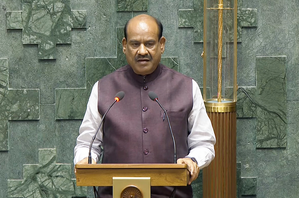There could be a debate on whether it was politically correct for the newly-elected Speaker of the Lok Sabha, Om Birla, to move a resolution on the first day of the new session to condemn an event that had happened half a century ago – Emergency, clamped by then Prime Minister Indira Gandhi. What is important is its timing and relevance. By trying to project the Congress as a real threat to the country’s Constitution and not the BJP as campaigned by the Congress in the recent LS elections, the ruling BJP has only confirmed how it has been shaken to its depths by its failure to form the government on its own. It is widely believed that the BJP could not get even a simple majority because the voters were seemingly convinced by the Congress campaign that the country’s Constitution was in danger and the threat was from the BJP. It was verbalised that the Constitution would be changed and dictatorship imposed if the BJP crosses the 400-mark as desired in the party’s slogan.
BJP now seems to be in a state of dread over the fact that there was a convincing narrative that created a public perception that the saffron party under PM Modi was a threat to the Constitution. This is something that may cause an existential crisis for the brand of politics that the RSS-controlled BJP represents. Over the past 50 years, opponents of the Congress have made enough political-electoral capital gains out of the Emergency Indira Gandhi imposed in 1975 for about 21 months. There is hardly any juice left in this lemon. Especially after Indira and her party faced ignominious defeat right after the elections, proving the power of the Indian voter and his rejection of the Emergency.
However, the fall of the Janata Party Gov’t occurred when Charan Singh split and sought help from the Congress to form a minority Gov’t at the Center. The Congress withdrew that support, Lok Sabha elections were held again and the Congress came back to power in 1980 and Indira was blessed by voters yet again, in a way washing away the Emergency sins after voters rejected the Janata Party. That marked democratic forgiveness and enabled the Congress to be born again.
The recent resolution brought forth in Parliament was politically loaded and it stated that dictatorship imposed by Indira Gandhi crushed the country’s democratic values and freedom of expression was strangled. During that “dark period” of Emergency, several people lost their lives at the hands of the “dictatorial” Congress government, it said and called on the members to observe two minutes’ silence in memory of the dead.
There is no doubt that the Emergency imposed in June, 1975 represents a dark chapter in post-independence history of India. The country can never condone Indira Gandhi’s rule by decree, suspension of civil liberties and free speech, arbitrary actions of the government, vindictive arrests of dissenters and Opposition figures using draconian preventive detention laws. Future generations need to learn the right lessons from the trauma the country lived through during that period.
But, using the first day of the new 18th Lok Sabha and the first day of the parliamentary session for this purpose is not only a breach of propriety, but shows the Speaker’s office in poor light. In a sense, the actions of the same Speaker in the last Lok Sabha smacked of authoritarianism and as such sermons from the Chair on upholding democratic principles do not inspire much confidence. Om Birla has earlier indiscriminately used his powers to suspend bulk of the Opposition MPs which could only have happened at the behest of the Gov’t. Seen in this light the Speaker’s resolution makes the whole exercise suspect.
The Parliament’s track record during the past 10 years makes its concerns for subversion of laws during Emergency insincere. Mere resolutions from the Chair, not backed by transparent and democratic functioning of the government, are nothing but lip service in the cause of strengthening democracy.






































